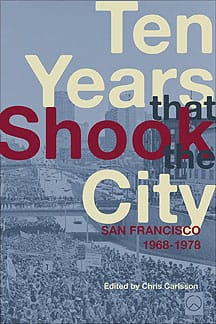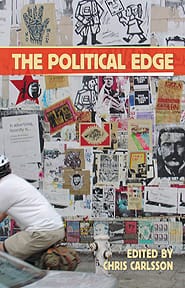Recent Posts
-
And Yet, We Go On
April 22, 2024
-
It IS Happening Here
February 16, 2024
-
General Ludd to General Intellect
January 11, 2024
-
Temporal and Geographic Edges
December 26, 2023
-
The Root of All Evil
October 13, 2023
-
Post-Pandemic Melancholia . . . Same As It Ever Was?
September 3, 2023
-
Chronicle of Deaths Foretold
June 24, 2023
-
Reparations is the Least We Should Do
May 11, 2023
-
We Are Not Alone
April 9, 2023
-
War and Anti-War
February 22, 2023
|
 Mysterious view towards downtown from hilltop above Hunter’s Point shipyards; eventually this will be residential housing… Everyone is chiming in on the Ed Snowden/NSA story. It’s great that Snowden has released all this information, just like it was great that Wikileaks released all those diplomatic cables, and great that Bradley Manning (evidently) leaked it to Wikileaks in the first place. We need to honor and defend these people, who are acting on behalf of a much greater cause than personal gain or fame. They are one important wing of the general delegitimizing of the United States and the neoliberal imperial project that the U.S. has pushed so hard for the past four decades.
But I’ve been surprised that the response to the NSA gathering everyone’s phone calls and emails has been so narrowly focused on the ostensible violation of personal privacy. The real issue is not the privacy of your personal communication. The NSA program is the government’s attempt to get a handle on networked uprisings, not so they can pre-empt them (though of course they’d like to), but to respond them as quickly as possible as they unfold. The goal of gathering all this meta-data is to be able to identify where the “hubs” are, who the people are who sit at key points in networks, helping pass news and messages along, but especially, who the people are who spread ideas and information from one network of people to the next, who help connect small networks into larger ones, and thus facilitate the unpredictable and rapid spread of dissent when it appears.
Sociologist Manuel Castells’ latest book Networks of Outrage and Hope: Social Movements in the Internet Age (Polity Press: 2012) reaches for a much less academic and more popular tone than he usually does. He examines the new social movements that erupted since 2011, giving a helpful summary of the course of events in Tunisia, Egypt, Spain, and the U.S., going behind the simplistic claims of a “twitter” or “social media revolution.” He shows how the presence of those technologies was important and indispensable for the development of these movements, but that it was the synergy between social media and actually existing networks, combining in public squares and camps, that took things to a new level. Elsewhere, Rodrigo Nunes wrote last summer on Mute Magazine’s web site a smart analysis of the organizational forms that emerged during 2011 and subsequently, arguing that the generally weak connections that prevail on social media could amalgamate into something greater:
under certain special conditions, the quantity of connections enabled by social media can indeed produce the quality of stronger ones – a marginal effect that weak ties always possess that is intensified by favourable circumstances, and which we could describe as a general lowering of each individual’s participation threshold.
We can see how the NSA spying program is geared to penetrating these new, not-really-spontaneous organizational forms that emerge on an adhoc basis and don’t seem to produce lasting institutional forms (at least not yet). Without the familiar unions or political parties as targets for infiltration and manipulation, the spooks in charge of imperial “peace” have been scrambling to head off the mysterious new ways people are figuring out to radically challenge the way life is shaped. Here’s Nunes again:
If there can be mass movements without mass organisations, it is because social media amplify exponentially the effects of relatively isolated initiatives. But that they do so is not a miraculous phenomenon that can magically bypass quality by producing quantity out of nothing; it requires the relay through hubs and strong tie groups and clusters that can begin to operationally translate ‘chatter’ into action. As that happens, under propitious conditions, the spread of information also aids the development of strong ties down the long tail: once a friend or family member goes to a demo, or you see stirring images of one, you are more likely to go, and so on. So we can only speak of ‘spontaneity’ if we understand the new flows of information and decision making as also being necessarily routed by previously existing networks and organisations and more tightly knit affinities, and thus along the lines of previously given structures that no doubt were transformed in the process; certainly not in the sense of an ideal ‘association of individuals’ who previously existed as individuals only.
 Banner hanging at the former Hayes Valley Farm, taken over on June 1 by folks who dubbed it “Gezi Gardens” in solidarity with the Turks… they were evicted by heavy police attack on the night of June 12… other photos from the short-lived occupation appear below. Continue reading Spook Governments, Networked Movements, Shifting Subjectivities
 Greg Williamson, burning the candle at both ends… pretty typical of him! Gregory Stuart Williamson, an unsung hero and longtime collaborator, died suddenly last week, apparently of a blood clot and stroke, while standing at a supermarket. He was not even 60 yet.
I want to take a moment to remember and honor Greg. I spent 17 years in close collaboration with him, and I don’t think anyone I ever worked with was as reliable, as diligent, as uncompromising, and as generous as Greg Williamson. He was also legendarily stubborn, curmudgeonly, and had a temper that had to be experienced to be believed. And if you were his friend, as I am proud to say I was for many years, you definitely experienced it!
But if there was ever anyone with a prickly outside and big soft inside, it was Greg Williamson. He was smart, critical, often sarcastic, and frequently hilarious. We had one of those office art Xerox signs on the wall for many years that said “The beatings will continue until morale improves” with the addition of an ‘s’ to morale, since Greg’s name in Processed World was Primitivo Morales. We would roll our eyes when he would launch on one of his oft-repeated aphorisms, like “The People United, Will Never Split a Pizza!” But now we’ll never hear it again.
 Passing the pipe, the cheshire grin emerging from the sweet cloud of smoke… It is said about some people that they would give you the shirt off their back. Greg was such a person. He worked as a programmer for many years, usually getting a decent salary but he went through his money as fast as he got it, and partly it was because he was damned generous. He came across the Bay (bitching about BART nearly every day) at his own expense, entering with two six-packs, a couple of bags of chips, and a pipe that was soon being passed around with the best quality pot available. Continue reading Gregory Stuart Williamson
I had the pleasure of seeing John Holloway last week, and meeting his compañera Eloína, an equally impressive character. They were in San Francisco thanks to Andrej Grubacic at CIIS inviting him to be a visiting scholar to present his work over three nights of lectures. I could only make the last one, where he set out to show how we are the crisis of capital. The next day we had them over for lunch, so we had a fantastic leisurely afternoon over a good meal, spending about three hours talking and laughing and enjoying the sun streaming into our dining room on a beautiful afternoon. Eloína is a computer scientist who has become an ethnobotanist, and runs a nursery in Puebla, Mexico where they live. Her work dovetailed with some other folks who passed through a year ago, who have done a lot of work on the hydrological history and future of the Valley of Mexico, so we happily shared their books.
 Sara Maria Acevedo caught me asking a question of John Holloway at his talk. I read John’s Crack Capitalism during the week before he arrived and really liked it. There are many places in the book where I felt a very strong resonance with the analysis I made in Nowtopia, and I was honored to discover that he quoted me in his book. Like his earlier book Change the World Without Taking Power, he is taking a very deep and basic Marxian concept, in this case the dual nature of work, and expanding it in fresh language, reworking the concept to confront and unpack the despair we often find ourselves feeling in the face of global capitalism. Part of his mission, too, is to repudiate the cul-de-sac of traditional Marxism with its elision of the dual nature of work in favor of an emphasis on the struggle between capital and labor. Holloway emphasizes again and again throughout his books that capital and abstract labor are two parts of the same thing. If your radical politics starts from what you do as wage-labor, as abstract labor, you are already trapped in the logic of capital. The point is to fight against abstract labor, against the subordination of our “doing” (whatever we may choose to do) to the logic of money and markets.
The ambition of Crack Capitalism is impressive. He situates most of the divisions and schisms facing contemporary radicals in the subordination of subjectivity to abstract labor. It can seem a bit dense and complicated at moments, but overall I want to congratulate him on a well-done effort to bring these concepts out into the light of day and making them quite accessible and clear. Here is a quote where he summarizes his critique of identity politics:
Identification or reification is an enormously destructive force in everyday struggle. We give our protests a name, a label, a limit. Our struggle is the struggle of women, of gays, of workers, of the unemployed, it is the struggle for indigenous rights, for uncontaminated food, for peace. It may be that we are at least vaguely aware that our struggles are part of a wider whole, perhaps even that they are the product of the way in which human doing is organized in the world, but, precisely because that form of organization seems permanent (‘it is easier to imagine the end of the world than the end of capitalism’), we enclose our struggles within limits, within an identity. And so we have a world full of protest, a world of people aware in some way that there is something fundamentally wrong with the way society is organized, and yet so many walls separating these struggles, so many dykes preventing them from flowing into each other. And all these walls are identifications, the grand framework identification of the capitalism-that-is-and-always-will-be, and the lesser identifications of ‘we are gay, we are women, we are indigenous, we are Basque, we are Zapatistas, we are anarchists, we are communists’. And all these identities become so easily the basis for sectarianism, the perennial self-destruction of the left that makes life easy for the police. Far more effective than any system of secret police, identity is the reproduction of capital within anti-capitalist struggle. (p. 114)
 Pioneer Monument gets a cleaning in SF… Continue reading Cracks, Openings, Uprisings
|
|

















